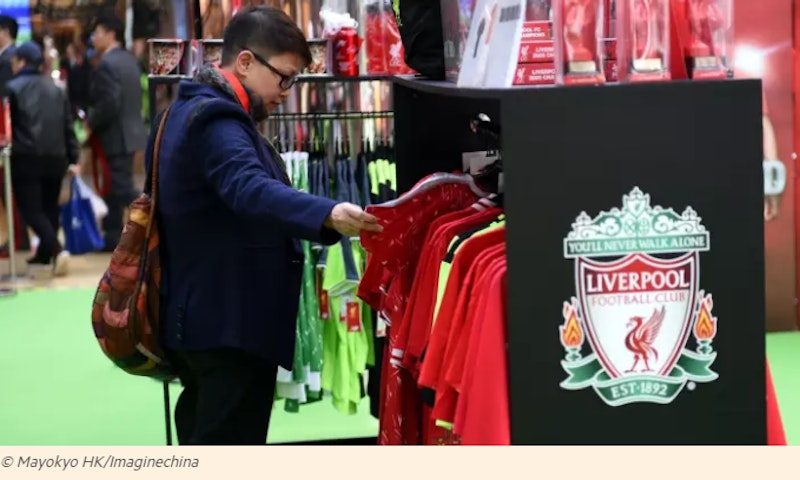In the News
Is Liverpool FC cannibalising its own market?
12th May 2017
For the big football clubs in the Premier League, China presents a massive opportunity. The fast-growing aspirant middle class in China, with disposable income to spare, are on the lookout for iconic foreign brands to buy. The English Premier League
is the most popular sports league in the world in terms of territories covered and income gained from foreign TV sales, and are looking to capitalise further on that in China. The top clubs now send their teams to China for pre-season tours, rather than Spain or Italy, and they aim to make money from selling their shirts and other merchandise online. Now Liverpool have decided to sell their own branded 'inferior' but official shirt in China at less than half the price of the usual product.
Sales of 'official' replica kit are a great money-earner for most football clubs - the vast majority of a club's supporters now own at least one home shirt, and this has become a required uniform when attending a game. The price charged is high - around £50 for a shirt - and Liverpool FC have recently launched a new home shirt to commemorate the club's 125th anniversary, which is for sale in global markets as well as here in the UK. It is strongly protected by copyright, and to protect its income, the club will pursue any counterfeiters.

In China, though, the market for fake, counterfeit goods of all type is strongly embedded in the economy, and very hard to fight as there is not enough enforcement of the law to prevent it. The official shirt costs $87 in China. Fake Liverpool shirts are available on Alibaba for as little as $4, and as reported in the FT, football clubs have struggled to make money from kit sales because of the ubiquity of fake merchandise, which is freely available in markets, sports shops and online shopping platforms such as Alibaba. So they have now launched a budget version, which is made of simpler materials and is not produced by New Balance, the club’s kit supplier, for $30.
A source close to the club told the Financial Times that the idea was to promote official club merchandise “at a competitive price for fans in that part of the world. The club does not condone counterfeit goods and hopes fans will chose an official product rather than a copy.” This is a great illustration of the difficulty of doing business in those overseas markets which are less closely regulated than producers are used to. Another problem that the Premier League has faced in China is selling TV rights to their matches - the encryped pay-TV model has not worked well there, because pirated live streams of TV are widespread, so it is hard to actually make the money that the TV deals suggest is available
It is hard to see why any Chinese customers would now pay over twice as much for the $87 shirt, unless the difference in quality is so obvious that the more expensive version carries a cachet for the wearer that the cheap official one does not. But if the official cheap one is still nearly eight times the cost of a counterfeit one, will anyone choose to pay $30?
The other issue is that this cheaper shirt won't be available to the club's fans in the UK - at least not officially. But will it somehow find its way onto the home market? The report in the FT quotes Simon Chadwick, a professor of sports enterprise at Salford Business School, who says that clubs have failed to understand the behaviour of Chinese consumers and, hence, struggled to monetise the value of their brands. "Professor Chadwick said that Liverpool’s initiative showed it was taking more care to respond to market needs and he suggested that the cut-price shirts could also be appropriate for other emerging markets like India, where China-made counterfeits are also widespread.
But he warned that there could be a backlash from UK fans who are already unhappy about the high cost of replica kits."
“If there’s a perception that home-based fans are being discriminated against, there could be some disquiet, especially at time when fan groups are becoming especially vocal about the costs of following their team,” he said.
You might also like

Blurred lines...
12th March 2015

Uber v Didi Chuxing: Round Two - In Brazil
6th January 2017

Fake Lego fools Lego's Chinese Boss!
28th January 2017